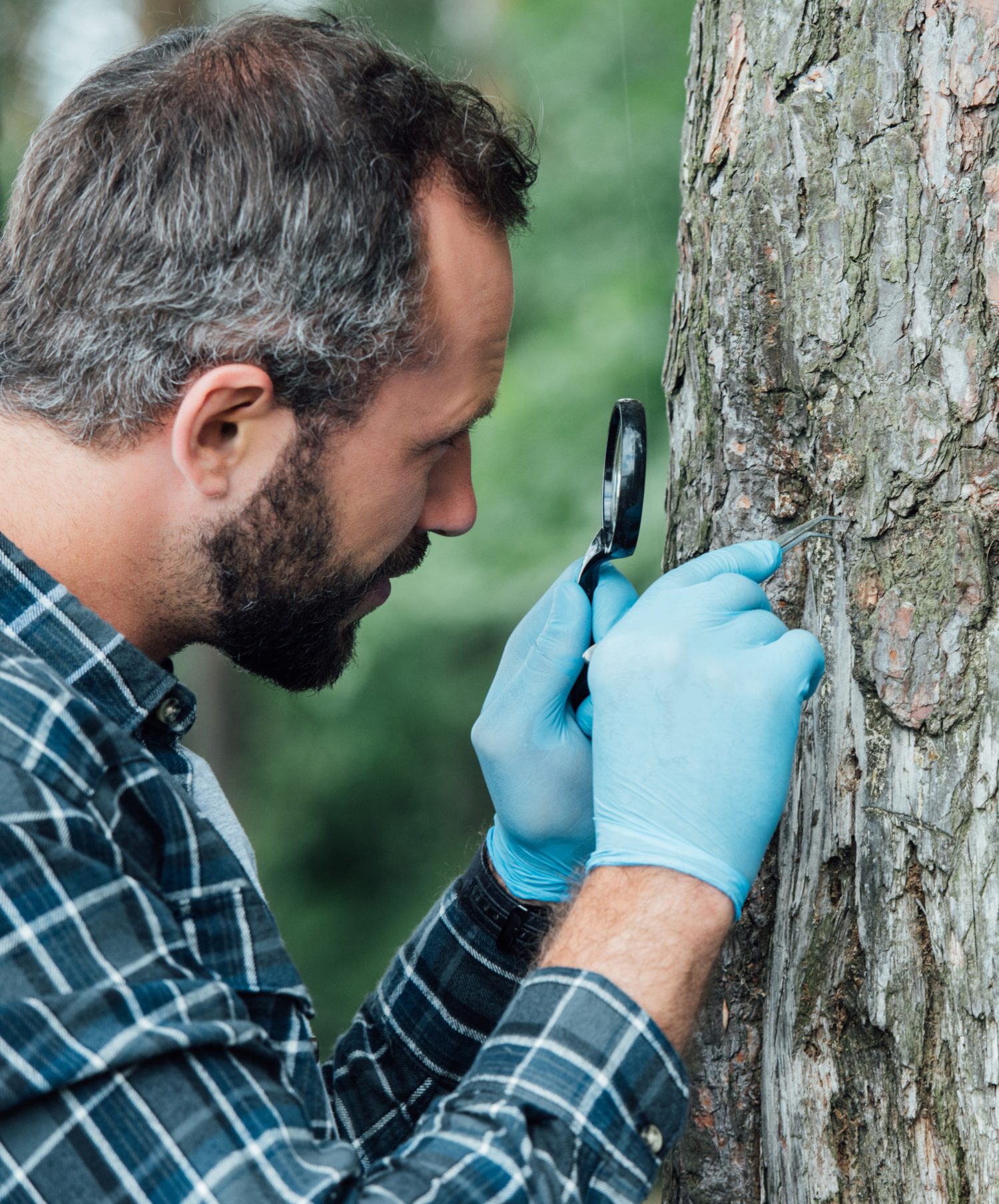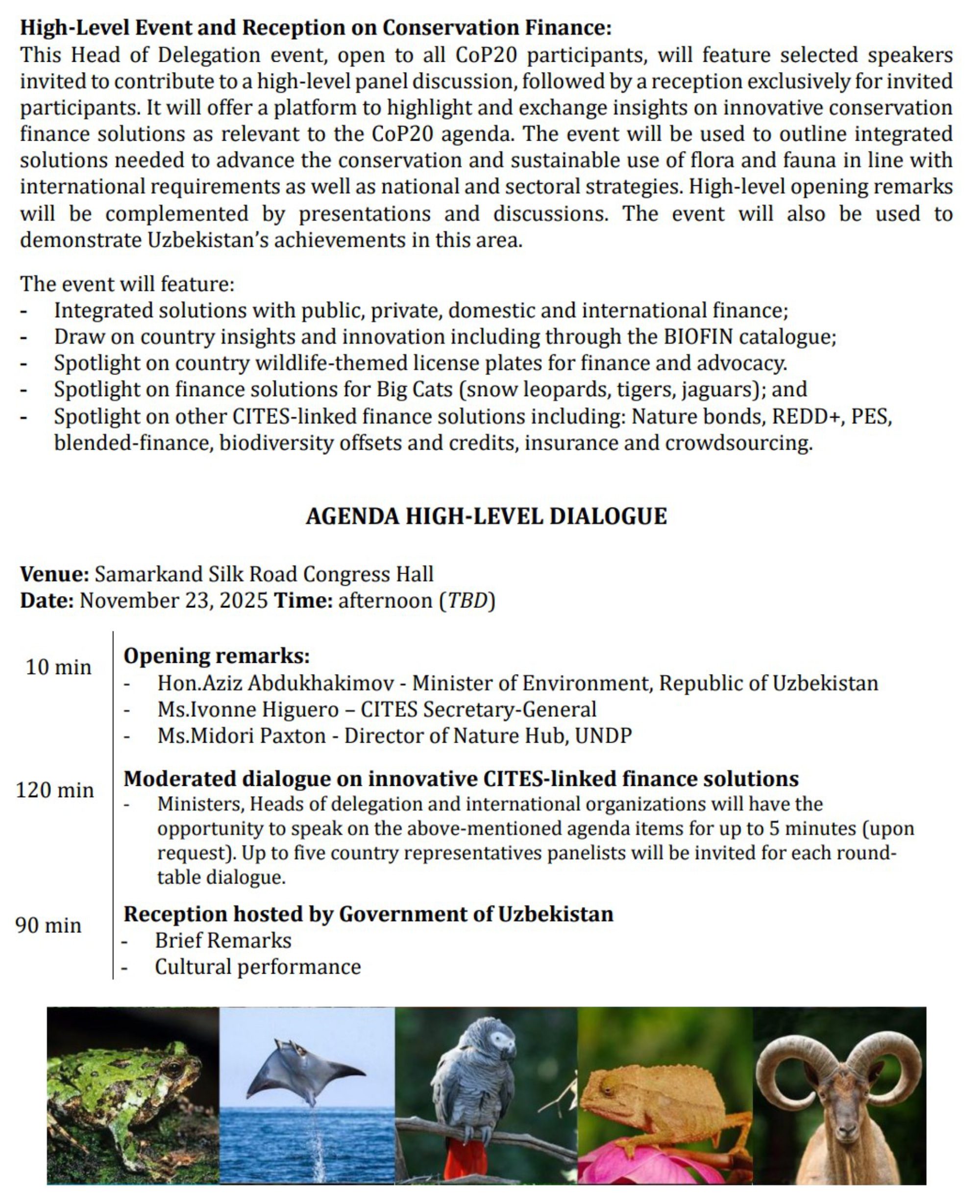
Nature Need More can with 100% certainty state that there is No Chance of achieving the CITES Strategic Vision 2030. Equally, there is No Chance of achieving the KMGBF Target 5 by 2030. Why do we say this? Because neither body is making any substantive effort to achieve a transparent, legal, and sustainable trade by 2030, that can be independently validated.
Instead, just look at what the CITES is actually doing to achieve its strategic vision for 2030.

In essence the CITES document submitted to CoP20 reports:
- We mapped the CITES Strategic Vision 2030 indicators against the KMGBF indicators and UN Sustainable Development Goals
- We will provide relevant data to the KMGBF monitoring framework
- We are rewording the CITES Resolution on cooperation with other biodiversity related conventions to talk about the KMGBF
- We had a 3-year disagreement over one of the indicators associated with Vision objective 1.4 (The appendices correctly reflect the conservation status and needs of species), which still is not resolved
The only thing discussed is wording changes in resolutions and agreeing on measurement indicators – neither are anywhere close to substantive action towards eliminating the illegal trade and unsustainable extraction.
And the CITES may provide what it calls ‘relevant data’ to the KMGBF but because this data is of such poor quality, I am not sure how useful this will be!
But the CITES isn’t alone regarding this irrelevant incrementalism. When it comes to the related targets of the CBD KMGBF the same thing is happening.
In August 2024 the Trade, Development and the Environment (TRADE) Hub project, the Center for International Forestry Research and World Agroforestry (CIFOR-ICRAF), the UN Environment Programme World Conservation Monitoring Centre (UNEP-WCMC), the University of Oxford, and the Conservation and Sustainability Consortium of Academic Institutions (CASCADE) hosted a workshop to come up with mechanisms for developing indicators and monitoring frameworks for key targets, including for Target 5 of the Global Biodiversity Framework. The result a proposed set of binary indicators for Target 5.
Let’s look at a couple of examples of the questions to be asked of the countries who have signed up to the CBD KMGBF:
- Does your country have legal instruments or other policy frameworks, and administrative measures, in place to ensure that the use, harvesting and trade of wild species: (select all that apply):
- prevent the overexploitation of wild species?
- minimize impacts on non-target species and on ecosystems?
- reduce the risks of pathogen spillover?
- respect, protect and support customary sustainable use of indigenous peoples and local communities?
- Does your country have processes in place to monitor and assess: (select all that apply)
- use, harvesting and trade of wild species?
- impacts of use, harvesting and trade of wild species on target and non-target species and on ecosystems?
- pathogen spillover to humans, wildlife and other species stemming from use, harvesting and trade of wild species?
- whether measures to achieve the sustainable, safe and legal use of wild species respect, protect and support customary sustainable use by indigenous peoples and local communities?
Is a country’s response to these binary indicators in anyway proof of achieving Target 5? No.
Does sending out these questionnaires to signatory countries help achieve Target 5 in any substantial way? No.
This performative nonsense exists to hide the fact that nobody is interested in taking any real action to achieve the relevant targets of the KMGBF. This is academics and conservation organisations keeping busy to hide the fact they are complicit in this charade for fear of losing funding if they point out the obvious.
In a world where big data is the new oil, the conservation world should be highly embarrassed about this!
The CITES and the CBD are both failing miserably in achieving their strategic visions, because that is what those who wield the power (the rich, large corporations and those in government doing their bidding) demand.
This is unsurprising under the current (neoliberal) ideology and economic settings. What grates, and is tragic for wildlife, is the fact that too many conservation bodies and academics play along.
And yet, the realisation that the neoliberal order is nearing its end is starting to dawn even on CITES participants. Looking at the CITES CoP20 agenda we can see that even though the complete failure of taking meaningful action towards the strategic vision is being underplayed, there are some interesting side events.
One event is the Head of Delegation Event on Conservation Finance. The document outlines potential finance solutions to address the funding crisis the CITES is in (and has been in for decades), including all the go to ones that have been discussed and/or tested, for some time – nature bonds, blended-finance, biodiversity offsets and credits. All the same phantom solutions that have been previously proposed and can’t deliver what is needed.
Conspicuous in its absence is the one solution that is obvious and proven, that businesses who profit from the trade cover the cost of regulation. Why do I say proven? Because a business pays for cost of regulation model is common practice in many industries, for example pharmaceutical companies have to cover the costs of drug trials and regulatory approval. This is not pocket change. In 2023, the total budget of the European Medicines Agency was €458 million. Around 89.0% of the Agency’s budget derives from fees and charges levied on business, 10.9% from the European Union contribution for public-health issues and 0.1% from other sources. This example shows that substantial funds can be raised from industry if the model is set up correctly. Given this obvious and proven way to regulate trade effectively, why is the business pays model not on the agenda?
Other themes hint at a growing nervousness in the sector. For example:
An Illusion of Legality: Wildlife Laundering in International Trade Co-hosted by Royal United Services Institute and TRAFFIC, the aim is to offer insights into how international and domestic regulatory systems can better close gaps that currently enable laundering under the cover of legality.
This event is also supported by the UK government via its UK international development and illegal wildlife trade initiatives. What is ignored is that the UK government STILL uses the 1970s paper permit system which enables such laundering. The UK has been in the process of modernising its CITES trade permit system for at least the last 5 years, according to the eCITES map. Before that the discussions Nature Needs More had with the DEFRA leading up to CITES CoP18, they said they had to get BREXIT done first! Now it’s time to get UK eCITES done.
Data for Enforcement CITES which is hosted by the Secretariat and ICCWC, with the aim of exploring the question, Why is data so important for combating wildlife crime? It also discusses the data-relevant tools available through ICCWC. This is an interesting one given the ICCWC has put out a document called 15 years 15 achievements, which it is also profiling at a CITES side event. When you look behind the facade of their glossy face you find that the ICCWC mentions its collaboration with INTERPOL in relation to its ‘achievements’, including Achievement 11, ICCWC supported the development of INTERPOL’s Wildlife Crime Linked to the Internet: Practical Guidelines for Law Enforcement Practitioners. You have to wonder how useful these collaborations really are when recently published research confirmed, environmental crime is being overlooked by global enforcement systems. Specifically documenting that, out of more than 7,000 Interpol Red Notices only 21 relate to environmental crimes. Let’s be honest, CITES trade measures have NEVER been enforced.
I suggest extra attention is paid to events interrogating the legal trade and legal trade data, including 1) Illicit Yet Legal Trade, 2) Rethinking Trade Data, 3) Ensuring Legality and Sustainability of the Live Wild Animal Trade in Central Asia – remembering ALL Central Asian countries still use the CITES 1970s paper permit system, and Born Free Foundation’s event Shaping CITES’ Future. It is necessary to have events like these on the agenda if CITES has a chance of surviving. But if they don’t push hard enough on the handful of critical issues, then they continue the incrementalism.
Here is a test, as you are sat in the main auditorium or in side events – ask yourself:
- Is the country who is talking/hosting/sponsoring still using the 1970s CITES paper permit system? You can check it out here. If they are, is anyone in the audience asking them when they will implement a modern digital system? If not, why not?
- What country is the conservation organisation talking/hosting headquartered in? Does that country still use a the 1970s CITES paper permit system? Is anyone in the audience asking the conservation organisation if they are lobbying their government to implement a digital CITES permit system? If not, why not?
- What countries are the conservation organisation talking/hosting working in? Do those countries still use a the 1970s CITES paper permit system? Is anyone in the audience asking the conservation organisation if they are lobbying these governments to implement a digital CITES permit system? If not, why not?
I say this, not because electronic permits are the panacea but because they are the very minimum action needed to demonstrate that the conservation world will no longer help the businesses who make huge profits from this trade maintain the illusion of sustainability.
In recent weeks we have had a number of emails to our organisation asking if we are going to CoP20. No, we’re not.
We continue to work in the background with a number of countries and politicians nudging eCITES along. It is over 20 countries now and not just 2 when we started. While this situation is ridiculous, how far this eCITES implementation gets in the next few years will let us know if the convention will survive or not; it is the very minimum action needed to demonstrate that the conservation world will no longer help the businesses hide what is a nothing short of a global business scandal.
We may go to the next CITES CoP, in 2028, given it will be the last before the KMGBF deadline. After the CBD missed all the 2020 Aichi Targets, it will be interesting to see the response to missing the KMGBF targets and goals (which are reflected in the CITES 2030 Strategic Vision).
Given the current state of the CITES, Nature Need More will keep saying, with 100% certainty, that there is No Chance of achieving Target 5 by 2030, for the 40,000+ species listed under the CITES. We don’t know if the CITES (or the CBD) will or even should survive if these milestones are missed again.
At the moment too few are willing to discuss the many problems with the convention, from the flawed trade model to the need for a business pays funding model. In doing this they are helping to maintain the illusion and delusion that the CITES regulator is effective. While this is bad enough, some representatives of corporate conservation have even said, “the introduction of concepts such as traceability confuse the core mandates of CITES”; this is either very commercially naïve or very stupid.
Yes, some submissions and some side events indicate the existential crisis the CITES is in. But the fear and anxiety have not yet reached panic levels and the realisation that the CITES as it presently exists is dead.
The same of course applies to corporate conservation agencies. We can only hope that the survival instincts of CITES delegates and the organisations they represent will kick in soon enough to finally champion the drastic changes that are needed to protect wildlife from overexploitation through international trade.
While not attending CITES CoP20, we work on our upcoming 2026 publication, Unsellable: The impossibility of selling solutions to the biodiversity and climate crisis.
The biodiversity and climate crisis are both a result of the overexploitation of natural resources by our industrial, fossil-fuel economy. They came about because of the ‘never-ending economic growth and progress’ narrative that has shaped capitalism and especially the last 45 years of neoliberalism. The economic ‘theory’ underpinning the narrative – neoclassical economics – is only distinguished by the sheer stupidity of its most basic assumptions. In turn, this has led to the creation of a massive, unproductive financial sector.
In our reports to-date we have demonstrated that even with greater levels of regulation, to genuinely protect species from overexploitation, significant profits can still be made.
The unwillingness of businesses, investors and the markets to even minimally curtail their shareholder primacy doctrine means that we can only explore a course-correction to abandon the guiding ideology – human domination over nature, ‘progress’, linear time, economic growth and accumulation of ‘stuff’.
It is a fact that wild species and planetary resources are being continuously overexploited to fuel unnecessary consumption and unneeded development to maintain profits for the few.
The wasted decades mean that it is getting too late to leave it just to regulation, even if it is good quality, mandated, well funded regulation.
In addition, attention must be turned to the other components of late stage capitalism, to close them down. It is time to remember that:

- Shareholder primacy didn’t really enter business boardrooms until the 1970s. Capitalists were making plenty of money before shareholder primacy became the accepted model.
- Limited Liability, which in a modern sense only became a uniform attribute of all corporations in the 20th century. As those who have dived into the Limited Liability business structure remind us, “corporations, stock markets and the corporate economy enjoyed a long and prosperous history well before limited liability in its modern sense became established and dominant”.
- Secrecy Jurisdictions, Shell Companies and Corporate Tax havens, which again only really took off after WWII, because capitalists were making money before this. Today they represent a mega pool of unproductive money in a world that needs funds to tackle multiple existential crises, including biodiversity loss and climate change.
When the corporate conservation sector has shown such commercial naïvety and a lack of urgency in modernising the CITES regulator and enabling this global business scandal to occur, it would appear unlikely that they will be needed or even able to deal with the coming course-correction. Genuine regulation to address biodiversity loss means attention must be turned to shareholder primacy, limited liability and corporate power etc. Not as much fun as looking at elephants, lions, sharks, oceans, Africa and the Amazon, I know. At CITES CoP20, profit making from predatory business activities must be front of mind, together with the current ease of greenwashing. Conservation NGOs must review their role in the reputation laundromat.
Billionaires have managed to successfully brand themselves as wealth creators, not extractors. The excess of the current phase and the misallocation of capital is a result of policies adopted over the last 150 years as capitalism evolved. Many of these policies must go if we want to achieve a course-correction. Yet, no counternarrative to the never-ending growth and progress story really exits; selling decline to a populace raised on growth is a non-starter. Instead, a plethora of phantom solutions (offsets, credits, certifications, ESGs etc) have been proposed to ‘ward off the day’ when a planned and regulated reduction of production and consumption will have to be adopted to manage the (long overdue) course correction needed.
Beyond a course-correction, which will cushion the fall, we need to abandon the guiding ideology of the last 300 years – human domination over nature.
In a follow up to Nature Needs More’s report, The BU$IN€$$ of Nature, in 2026 we will publish Unsellable: The impossibility of selling solutions to the biodiversity and climate crisis.
We are accelerating to a point where the CITES, CBD and conservation world’s ineffectiveness will become irrelevant.

